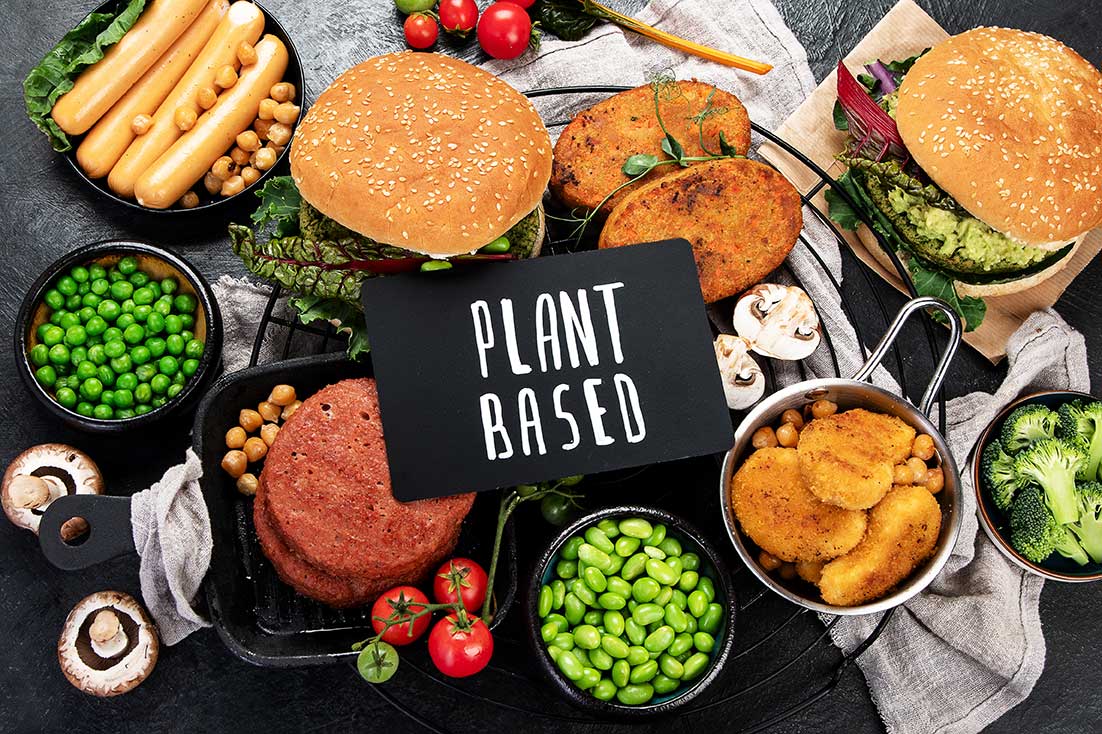Exploring the Rise of Plant Based Chicken in Miami Restaurants
Exploring the Rise of Plant Based Chicken in Miami Restaurants
Blog Article
All About Healthy And Balanced Food: Advantages of Embracing Plant Based Options
The discussion bordering plant-based diet regimens has actually gained significant focus recently. Many people are discovering the possible health and wellness benefits, nutritional advantages, and environmental influences linked with these nutritional selections. As individuals end up being more conscious of their food's influence on well-being and sustainability, inquiries develop concerning the usefulness of taking on such a way of life. What specific changes can one anticipate, and just how might these options reshape not just individual health and wellness but also the world's future?
Recognizing Plant-Based Diet Regimens
Several individuals associate plant-based diet regimens primarily with vegetarianism or veganism, these diet plans can incorporate a large range of consuming patterns that prioritize whole, minimally refined plant foods. Such diet regimens often consist of fruits, vegetables, whole grains, nuts, seeds, and legumes, while limiting or getting rid of animal products. This versatility enables people to tailor their dietary choices according to dietary requirements and personal choices. Some may adopt a mostly plant-based diet while still periodically consuming meat or dairy products, frequently described as a flexitarian method. The focus stays on including even more plant foods, which can result in a varied range of meals and tastes. Comprehending these different analyses of plant-based consuming is necessary for valuing its accessibility and allure in modern food culture.
Wellness Benefits of Plant-Based Foods
The health benefits of plant-based foods are substantial, supplying a nutrient thickness advantage that sustains total health. Research study indicates that these foods can boost heart health and play an important function in reliable weight administration. By integrating extra plant-based choices, people might enhance their nutritional choices and advertise long-lasting health and wellness.
Nutrient Thickness Advantage
Nutrient density plays a vital function in the health and wellness advantages of plant-based foods, making them a compelling option for those looking for a balanced diet regimen. Plant-based foods, such as fruits, vegetables, legumes, nuts, and entire grains, are typically abundant in important vitamins, minerals, and antioxidants while being reduced in calories. This high nutrient thickness permits individuals to consume less calories while still meeting their nutritional needs. Furthermore, these foods are packed with nutritional fiber, advertising gastrointestinal health and helping in weight management. By integrating nutrient-dense plant-based alternatives, consumers can boost their overall health, sustain their body immune systems, and reduce the danger of chronic conditions. Ultimately, the nutrient thickness of plant-based foods underscores their importance in a health-conscious way of life.
Heart Health Enhancement

Weight Monitoring Support
In addition to advertising heart health, a plant-based diet plan can significantly aid in weight management. This dietary approach emphasizes whole foods such as fruits, veggies, vegetables, nuts, and entire grains, which are typically lower in calories and higher in fiber contrasted to animal-based items. The high fiber web content helps raise satiation, minimizing total calorie intake. Plant-based diet regimens are often rich in vital nutrients while reduced in undesirable fats, making it simpler to maintain a healthy and balanced weight. Study indicates that people that embrace a plant-based lifestyle have a tendency to have reduced body mass indexes (BMIs) and experience more effective weight-loss compared to those who take in meat-heavy diets. As a result, welcoming plant-based options is a tactical choice for reliable weight administration
Nutritional Value of Plant-Based Components
Plant-based active ingredients are rich in crucial nutrients, using a diverse variety of vitamins, minerals, and antioxidants that add to general wellness. A comparison of protein resources reveals that while animal products are frequently checked out as superior, lots of plant-based options give sufficient healthy protein and other beneficial compounds. Understanding the nutritional worth of these ingredients can help people make educated dietary selections.
Essential Nutrients in Plants
Nutrient-rich ingredients located in plants use a varied array of essential vitamins and minerals that contribute significantly to general wellness. These components are rich in vitamins A, C, and K, which sustain immune function, vision, and blood clot, specifically. Furthermore, plants offer vital minerals such as potassium, magnesium, and calcium, crucial for heart wellness, muscle mass feature, and bone strength. The presence of fiber in plant-based foods aids food digestion and advertises a healthy and balanced gut microbiome. Antioxidants, located perfectly in fruits and veggies, assistance combat oxidative anxiety and lower swelling. Many plant foods are low in calories yet high in nutrients, making them an excellent choice for those seeking to preserve a healthy and balanced weight while guaranteeing optimal nutrient intake.

Comparing Healthy Protein Sources
Protein sources differ considerably in their dietary profiles, with plant-based components supplying unique benefits. Unlike pet healthy proteins, which commonly have saturated fats and cholesterol, plant proteins tend to be lower in these unhealthy elements. Legumes, nuts, seeds, and entire grains are rich in essential amino acids, fiber, vitamins, and minerals. Lentils provide high healthy protein web content along with significant iron and folate, while quinoa is a complete protein, offering all 9 vital amino acids. In addition, plant-based healthy proteins are typically gone along with by antioxidants and phytochemicals that sustain general health. The change to plant-based healthy protein resources not only boosts dietary intake yet likewise aligns with lasting nutritional techniques, minimizing ecological influence and promoting long-lasting health benefits.
Environmental Influence of Plant-Based Consuming
As recognition of environment change grows, lots of people are exploring lasting nutritional options that can greatly decrease their ecological footprint. Plant-based eating has become a considerable contributor to lowering greenhouse gas exhausts, which are mainly connected with livestock production. The farming of fruits, legumes, grains, and veggies normally calls for less sources, such as water and land, contrasted to animal farming. Additionally, plant-based diet plans can lead to reduced logging, as much less land is needed for grazing livestock or growing animal feed. By changing in the direction of plant-based alternatives, consumers can sustain biodiversity and advertise healthier communities. Overall, accepting plant-based eating not only advantages individual health and wellness however also represents an important step toward environmental sustainability and preservation efforts.
Overcoming Common Misconceptions
While many individuals recognize the advantages of a plant-based diet, several mistaken beliefs often discourage them from totally accepting this way of life. An usual belief is that plant-based diet regimens lack enough protein; nevertheless, countless plant resources, such as beans, nuts, and tofu, offer enough protein. In addition, some presume that this diet is pricey, when in truth, staples like beans, rice, and seasonal vegetables can be quite economical. Another false impression is that plant-based consuming is extremely restrictive, whereas it in fact uses a varied variety of foods and tastes. Lots of fret that a plant-based diet may lead to deficiencies, yet with proper preparation, individuals can acquire all essential nutrients, consisting of minerals and vitamins, while taking pleasure in a wide range of delicious dishes. Vast Tips for Transitioning to a Plant-Based Way of living
Making the shift to a plant-based way of living can be an enhancing experience, though it commonly calls for some advice to browse the initial adjustments. People are encouraged to start progressively, including more fruits, vegetables, beans, and whole grains into their dishes while lowering meat and dairy products intake. Dish planning is essential; preparing an once a week menu can assist alleviate the adjustment and protect against last-minute harmful choices. Checking out cooking techniques and new recipes can also preserve and enhance the experience exhilaration concerning plant-based consuming. Additionally, joining assistance teams or neighborhoods can offer inspiration and share beneficial ideas. Finally, staying notified regarding nourishment assurances well balanced meals, preventing deficiencies while fostering a healthy and balanced, satisfying plant-based lifestyle.
Delicious Plant-Based Dish Ideas
Checking out scrumptious plant-based meal concepts can influence individuals to welcome a more healthy diet regimen. One popular choice is a passionate quinoa salad, including cherry tomatoes, cucumber, and a tangy lemon-tahini clothing. Homepage Another favorite is a full-flavored lentil stew, packed with carrots, celery, and fragrant herbs, excellent for a reassuring supper. For morning meal, over night oats made with almond milk, chia seeds, and covered with fresh you could try this out berries offer a healthy beginning to the day. Additionally, a dynamic vegetable stir-fry with tofu and a selection of vivid veggies can be a quick yet satisfying dish. Luscious avocado toast on whole-grain bread, sprayed with seeds and seasonings, supplies a straightforward yet flavorful snack. These dishes display the variety and richness of plant-based eating.

Regularly Asked Concerns
Can a Plant-Based Diet Provide Sufficient Protein?
The inquiry of whether a plant-based diet plan can offer enough healthy protein prevails. Various resources, consisting of vegetables, nuts, seeds, and whole grains, can fulfill protein requires efficiently, sustaining a balanced and nutritious diet for individuals.
Are Plant-Based Diet Regimens Appropriate for Kid?
The suitability of plant-based diet regimens for kids relies on cautious preparation. Appropriate nutrients must be ensured, including vitamins, proteins, and minerals. With appropriate guidance, such diet plans can sustain healthy growth and growth in children.
How Do I Eat in restaurants on a Plant-Based Diet plan?
Eating out on a plant-based diet includes looking for restaurants with diverse food selections, asking for modifications, and checking out vegan-friendly options. Preparation ahead and interacting nutritional choices can enhance the dining experience while preserving nutritional selections.
What Are Typical Allergens in Plant-Based Foods?
Typical irritants in plant-based foods consist of soy, gluten, nuts, and seeds - Plant Based Beef. Individuals complying with a plant-based diet regimen should understand these allergens and check out tags thoroughly to prevent negative responses and assure secure consumption
Can Plant-Based Diets Aid With Weight Loss?
Research indicates that adopting a plant-based diet regimen may help with weight-loss because of its commonly reduced calorie density and higher fiber content. This combination can enhance satiety, helping people handle their calorie consumption effectively. Lots of people connect plant-based diets primarily with vegetarianism or veganism, these diets can incorporate a wide array of consuming patterns that focus on whole, minimally processed plant foods. Nutrient thickness plays a crucial duty in the wellness benefits of plant-based foods, making them a compelling selection for those seeking a balanced diet plan. Plant-based diet regimens have been shown to noticeably enhance heart health and linked here wellness, as they frequently include elements that support cardiovascular function. In enhancement to advertising heart health, a plant-based diet plan can considerably assist in weight administration. A common idea is that plant-based diets lack enough protein; however, countless plant sources, such as beans, nuts, and tofu, give adequate protein.
Report this page